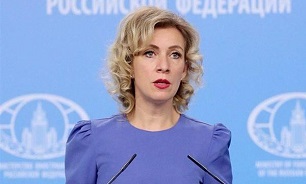UK Indulging in Mud-Slinging Campaign Against Russia Over Ex-Spy Case
 "What the United Kingdom is doing is nothing but a mud-slinging and adverse publicity campaign of the global scale," she said in an interview with the Voskresky Vecher (Sunday Evening) weekly news roundup on the Rossiya-1 television channel.
"What the United Kingdom is doing is nothing but a mud-slinging and adverse publicity campaign of the global scale," she said in an interview with the Voskresky Vecher (Sunday Evening) weekly news roundup on the Rossiya-1 television channel.
"What do we see? A colossal failure from the point of view of evidence: London simply has no evidentiary basis to hide behind," the Spokeswoman stated.
"Not to prove anything, but to simply shield itself," she stressed, adding that London is staking on the widest possible consolidation of foreign political resources.
"Now, the only thing that can save [UK Prime Minister] Theresa May, and the United Kingdom in principle, I mean the political establishment, is global support, first of all from the European Union and NATO partners," Zakharova said.
The leaders of EU countries earlier passed a decision to recall EU Ambassador to Russia Markus Ederer for consultations.
A source told TASS on the sidelines of the EU summit in Brussels that some member states were looking at either recalling their diplomats from Russia or expelling Russian diplomats.
The United Kingdom has intentionally classified information about its cooperation with the Organization for the Prohibition of Chemical Weapons (OPCW) to be able to manipulate data on the Skripal case, Zakharova pointed out.
"Even information about London’s relations with the Organization for the Prohibition of Chemical Weapons has been classified. We learn about what is going on there only from leaks in the mass media," the diplomat stressed, underlining that "What are these leaks are meant to? On the one hand, they hint that London is cooperating with the international organization. It is obviously meant to raise the level of trust to what the British officials are saying. On the other hand, it is unofficial information, which can be further adjusted."
She cited leaks in the British media alleging that OPCW representatives had been granted access to the Skripals.
"And how did OPCW representatives know who they had been shown, who those people really were? Were they the Skripals? Or people resembling the Skripals?," Zakharova noted.
"As of now, all the Russian ambassadors in London has received mere formal replies. More to it, poorly worded replies," she said, adding that "The quality of work of the British side is simply surprising, with hasty actions and complete lack of in-house coordination."
A serious diplomatic scandal erupted between Moscow and London early last week, following the poisoning of Skripal, who had been convicted of high treason in Russia, and his daughter Yulia.
The two of them suffered the effects of a nerve agent in the British city of Salisbury on March 4. They are currently in the hospital in a critical condition.
London accused Moscow of being involved in the attack but failed to present any evidence. British Prime Minister said the substance used in the attack had been a Novichok-class nerve agent developed in the former Soviet Union.
She stated that 23 Russian diplomats would be expelled from the country within one week and that all planned high-level bilateral contacts had been suspended.
Russia has rejected all of the United Kingdom’s accusations.
On March 17, the Russian Foreign Ministry stressed that in response to the UK’s steps, 23 British diplomats would be expelled within a week.
In addition, Britain’s consulate in St. Petersburg would be closed and the British Council’s operations in Russia would be terminated. Furthermore, Moscow pointed out that further measures could be taken "should there be any more hostile actions against Russia."
